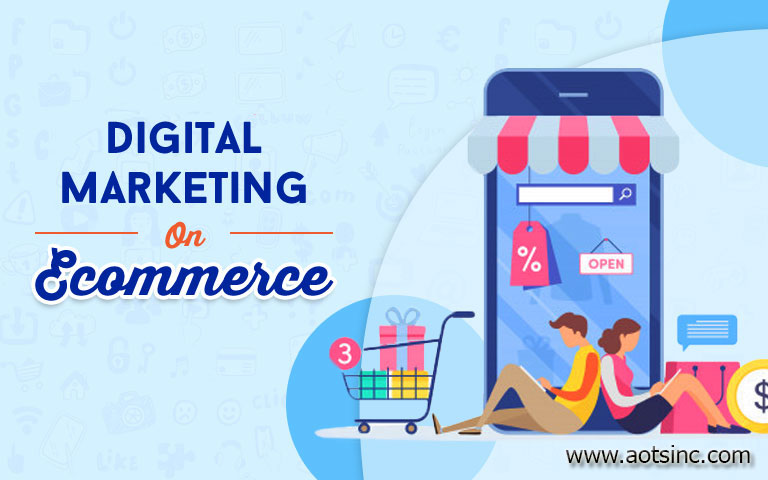Introduction:
In the fast-paced world of e-commerce, digital marketing has become an essential tool for driving growth, increasing sales, and staying ahead of the competition. With the ever-increasing number of online businesses, it’s crucial to have a well-planned and executed digital marketing strategy to make your e-commerce venture stand out. In this article, we will explore the key strategies and techniques that can help your e-commerce business thrive in the digital landscape.
Search Engine Optimization (SEO):
SEO is the cornerstone of digital marketing for e-commerce. When your website ranks high on search engines like Google, you’re more likely to attract organic traffic. Invest in keyword research, optimize product listings, and create valuable content to improve your website’s visibility in search results.
Content Marketing:
High-quality content not only informs your customers but also improves your website’s search engine rankings. Consider creating blog posts, product guides, and videos that provide value to your target audience. Content marketing can help establish your brand as an authority in your niche.
Email Marketing:
Email marketing is an effective way to engage with your existing customers and keep them informed about new products, promotions, and updates. Personalized and well-timed emails can drive sales and build customer loyalty.
Social Media Marketing:
Social media platforms offer a vast audience for e-commerce businesses. Develop a strong presence on platforms like Facebook, Instagram, Twitter, and Pinterest. Create engaging content, run targeted ads, and leverage user-generated content to build your brand and drive sales.
Pay-Per-Click (PPC) Advertising:
PPC advertising allows you to reach potential customers directly through platforms like Google Ads and Facebook Ads. These ads can be highly targeted, and you only pay when someone clicks on your ad. Properly managed PPC campaigns can provide an excellent return on investment.
Influencer Marketing:
Collaborate with influencers who have a significant following in your niche. They can help you reach a larger and more engaged audience. Ensure that the influencers align with your brand values and products for authentic endorsements.
Retargeting:
Use retargeting ads to re-engage visitors who have shown interest in your products but didn’t make a purchase. These ads can help remind potential customers and encourage them to return and complete a purchase.
Mobile Optimization:
As mobile shopping continues to rise, it’s crucial to have a mobile-optimized website and advertising campaigns. Ensure that your website is responsive and provides a seamless experience for mobile users.
Analytics and Data Analysis:
Regularly analyze your digital marketing efforts using tools like Google Analytics. This data can provide insights into what’s working and what needs improvement, enabling you to fine-tune your strategies.
Increased Visibility and Reach:
Digital marketing enables e-commerce businesses to reach a global audience. With the right strategies, you can extend your reach to potential customers far beyond your physical location, increasing your visibility and customer base.
Cost-Effective Marketing:
Compared to traditional marketing methods, digital marketing is often more cost-effective. With proper planning and targeting, you can allocate your budget efficiently and generate a higher return on investment (ROI).
Data-Driven Decision Making:
Digital marketing provides access to valuable data and analytics. This data allows e-commerce businesses to track the performance of their campaigns, understand customer behavior, and make informed decisions to optimize their marketing efforts.
Personalization:
Digital marketing tools enable e-commerce businesses to create highly personalized marketing campaigns. By analyzing customer data and behavior, you can tailor messages and offers to individual preferences, increasing the chances of conversion.
Targeted Advertising:
Digital marketing platforms offer sophisticated targeting options. You can reach specific demographics, interests, and behaviors, ensuring that your marketing efforts are seen by the most relevant audience.
Real-Time Engagement:
Through social media, email, and other digital channels, e-commerce businesses can engage with customers in real-time. This immediate interaction can address customer queries, provide support, and enhance the overall shopping experience.
Competitive Advantage:
Given the widespread adoption of digital marketing, having a strong online presence and executing effective digital marketing strategies can give your e-commerce business a competitive edge in a crowded market.
Measurable Results:
Unlike traditional marketing methods where results can be challenging to measure accurately, digital marketing offers precise metrics. You can track click-through rates, conversion rates, website traffic, and more, making it easier to gauge the effectiveness of your campaigns.
Flexibility and Adaptability:
Digital marketing allows e-commerce businesses to adapt quickly to changes in the market, customer preferences, or even external factors like global events. This flexibility is vital in staying relevant and responsive.
Improved Customer Insights:
Digital marketing provides valuable insights into customer behavior, preferences, and purchase patterns. This data can be used to refine product offerings, pricing, and marketing strategies to better meet customer needs.
Enhanced Brand Building:
E-commerce businesses can use digital marketing to build and strengthen their brand. Consistent branding across online channels, along with compelling content and messaging, can help create a distinct and memorable brand identity.
24/7 Availability:
With e-commerce, your online store is open 24/7, allowing customers to shop at their convenience. Digital marketing ensures that potential customers are aware of your store’s availability and offerings.
Social Proof and Reviews:
Digital marketing can help showcase positive customer reviews and social proof, which can significantly influence the purchasing decisions of potential customers.
Conclusion:
In the world of e-commerce, a successful digital marketing strategy can be the difference between thriving and struggling. By combining these strategies and techniques, e-commerce businesses can reach a wider audience, drive sales, and build long-term customer relationships. Remember that the digital marketing landscape is continually evolving, so staying up-to-date with the latest trends and technologies is essential for continued success in the e-commerce space.
